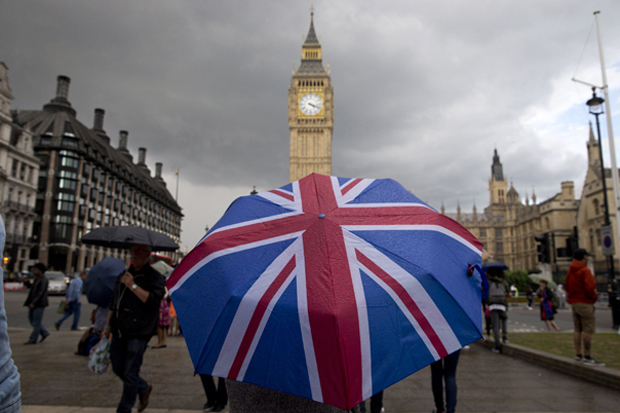The fact that we get sun when we expect hail and hail when we expect sun provides those of us who live in Britain with a handy subject to cover the most awkward of conversational lulls. The weather forms the backbone of our national discourse — perhaps because our own personalobservations and doom-laden predictions are about as likely to be as accurate as the official forecasts.
To look on the sunny side for a moment, perhaps this should cheer us. If we can’t predict what the weather is today, then perhaps — since we can do precious little about it — we should not be quite so alarmed about climate-change predictions. A government report released this month forecasts that conditions will become ever more extreme over the next 30 years. The Climate Change Risk Assessment warned that UK temperatures could rise as high as 48°C during the summer, and that dry spells could last for years, causing wildfires and water shortages. Droughts in countries close to the equator could result in more migration to Britain, while whole wildlife species might be destroyed.
Hopefully, the CCRA’s predictions will soon prove as accurate as the rest of our weather forecasts. A new Swedish app called Climendo contrasts the predictions of 10,000 weather stations and rates how accurate they are — and has revealed that American and European forecasters predicted British weather with greater precision than the Met Office last month. The British service lost its contract with the BBC last year due to an EU directive which stated that the broadcaster legally had to put its weather contracts out to tender. Perplexingly, the Met Office still provides the majority of the data communicated by the new service provider, acting as an unacknowledged middle man.
For most of us, correct forecasts can’t come soon enough. As I type this, it is tipping it down outside, although the BBC website is predicting bright sunshine, while my iPhone is saying it won’t rain until later in the afternoon. Reliable weather forecasts are doubly important when you are the parent of a small child: my daughter has frozen in a vest when it was meant to be blissfully sunny and been drenched by sleet when forecasters insisted it would be dry outside. The best (yet irritatingly cumbersome) solution is multiple layers and an umbrella at all times.
Given the ridicule and opprobrium heaped on weather forecasters for getting predictions wrong (think Michael Fish before the great storm of October 1987) it is perhaps unsurprising that the language they use is extremely vague. ‘A mixture of sunshine and showers’ covers all eventualities, while words such as ‘should’, ‘possibly’, ‘probably’, ‘may’, ‘likely’ and ‘some’ abound. With this amount of bet-hedging, onehalf expects the weather man to say jovially: ‘And we’ll all be reaching for those umbrellas as rain sweeps across the country — though of course, this forecast will be party to my usual lack of accuracy, so we might not need those brollies after all.’
We aren’t all as hapless and convivial as weather presenters, though. Many of us get angry when the forecasters get it wrong — and, strangely, it seems that communist leaders feel more furious than most. Supreme leader Kim Jong-un is said to have toured meteorological outlets in North Korea, lambasting their employees for the fact that there are ‘too many incorrect’ weather forecasts. The leader is said to be dismayed at the potential detrimental effect on the economy.
And he’s not alone. Soviet dictator Joseph Stalin, a man with absolute power, knew that his communist utopia must boast accurate weather predictions. Alas, Russia’s experts were unable to ensure correct forecasts either — leading Stalin to carry out a purge of meteorologists in 1933. Even this life-or-death incentive failed to galvanise the workers. In 1946 Stalin listened to the weather forecast again and was apoplectic to discover that it was still totally wrong, ordering his sidekick Voroshilov to root out, once again, the ‘saboteurs’.
The Met Office might not be operating under quite so much pressure but it is nevertheless trying to do better. It has in recent days launched a scheme asking amateur weather enthusiasts to place miniature £60 meteorological stations in their gardens to help provide much needed additional data. Of particular value to the Office, it seems, is assistance in targeting thunderstorms, which are notoriously difficult to predict.
But chances are that this initiative will fail too. And we will have to revert yet again to the only foolproof method ever invented for deciphering the British weather: sticking one hand out of the window and gazing up at the heavens.
The post What a shower appeared first on The Spectator.
Got something to add? Join the discussion and comment below.
Get 10 issues for just $10
Subscribe to The Spectator Australia today for the next 10 magazine issues, plus full online access, for just $10.
You might disagree with half of it, but you’ll enjoy reading all of it. Try your first month for free, then just $2 a week for the remainder of your first year.














Comments
Don't miss out
Join the conversation with other Spectator Australia readers. Subscribe to leave a comment.
SUBSCRIBEAlready a subscriber? Log in